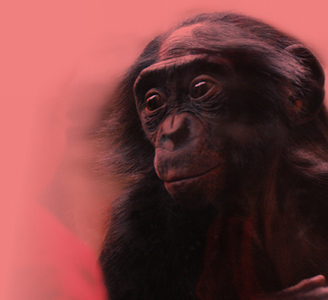Book
In this lively discussion of his landmark research, esteemed primatologist Frans de Waal argues that our capacity for moral behavior does not begin and end with religion, but instead comes from within as a product of evolution.
One central question: “Do we need God to be good?”
For many years, de Waal has observed chimpanzees soothe distressed neighbors and bonobos share their food. Now, he delivers fresh evidence for the seeds of ethical behavior in primate societies that offers the basis for human goodness. Interweaving vivid tales from the animal kingdom with thoughtful philosophical analysis, de Waal seeks a bottom-up account of morality. In doing so, de Waal for the first time explores the implications of his work for our understanding of modern religion. Whatever the role of religious moral imperatives, he sees it as a “Johnny-come-lately” role that emerged only as an addition to our natural instincts for cooperation, fairness, and empathy.
But unlike the dogmatic neo-atheist of his book's title, de Waal does not scorn religion per se. Instead, he draws on the long tradition of humanism exemplified by the painter Hieronymus Bosch and asks reflective readers to consider these issues from a positive perspective: What role, if any, does religion play for a well-functioning society today? And where can believers and non-believers alike find the inspiration to lead a good life?
Rich with cultural references and anecdotes of primate societies, The Bonobo and the Atheist engagingly builds a unique argument grounded in evolutionary biology and moral philosophy. Ever a pioneer thinker, de Waal delivers a heartening and inclusive new perspective on human nature and our struggle to find purpose in our lives.
Here is an interview that appeared in Summer 2012 in “The Human Prospect” (a neohumanist perspective) about the book's background.
Q: You are currently working on a book called ”The Bonobo and the Atheist: In Search of Humanism Among the Primates,“ scheduled for release in the early Spring of 2013. This is an intriguing title. What themes will you explore in this book?
A: My book is about how morality doesn't come from above. It rather is an evolutionary product. The book is rooted in my research on monkeys, apes, elephants, and other animals, and my conviction that they show the beginnings of morality. I have written about this before, but now I am bringing religion into the mix. Even though I don't think religion is absolutely critical, it is also not irrelevant. The question how humans would fare without it is hard to answer for the simple reason that religion is universal. There are no societies that are not now and never were religious.
Even though I myself am not a believer, the word “atheist” in the title does not refer to me but to the new brand of atheists, who hate religion and make fun of it. This is easy to do, but the bigger issue is not if religion is true or false, but why humans everywhere believe in the supernatural and how it is linked to the distinction between right and wrong.
Q: How has your study of the higher primates shaped your views on the origins of human morality?
A: Morality promotes cooperation. It asks us to put our personal interests on the back-burner and work for the common good. It is a complex system that religion and philosophy have tried to capture in simple rules (such as the golden rule or the ten commandments), but these rules provide only imperfect summaries. We like to think of morality as top-down, but this is merely a left-over of the story of God on the mountain top. There is no evidence that it started out as a top-down system. Science is rather coming around to the Humean view of morality guided by intuitions and passions. Looking at other primates, we recognize many of the same tendencies that underlie our morality, such as rules of reciprocity, empathy and sympathy, a sense of fairness, and the need to get along. Monkeys, for example, object to unfair distributions of resources (see the end of my TED talk), and chimpanzees do each other favors even if there is nothing in it for themselves. Bonobos are probably the most empathic animals of all, and the recent genome data places them extremely close to us.
Human morality goes further than this, but all of these tendencies play a role. We have been indoctrinated that nature is “red in tooth and claw,” and entirely selfish, but we are now learning about conflict resolution, cooperation, empathy, and the like, in our fellow primates. They are far more harmony-oriented than people realize. I don't necessarily call apes “moral beings,” but we share with them an old psychology without which we'd never have become moral.
Q: What role do you assign to religion (if any) in morality, both for the individual and culture and society?
A: Cooperation and social harmony have always been to the advantage of our species, long before modern religions arose, which is just a couple of thousand years ago. Biologists are unimpressed by that kind of time scale. I am sure our ancestors cared about each other, and about joint efforts and fairness, for a million years, or longer. Things changed with the agricultural revolution, however, about 12,000 years ago. We began to expand our societies to include thousands, and now millions of people. Rules of reciprocity, empathy, and monitoring everyone's contributions didn't do the job anymore. It became too easy to cheat the system. A top-down approach became necessary to enforce the same degree of cooperation, preferably one backed by an omniscient supernatural force who kept an eye on everyone and promised heaven or hell dependent on how well you behaved. In this view, modern religion is not at the root of morality, but arose as an addition, as a way to fortify the system. The big question is how essential this addition is for a well-functioning society. And if it was essential in the past, is it still today?
Q: I know that you have been an observer of the atheist/freethought/humanist movement. You have also been critical of some of the “new atheists.” (See “The God-Science Shouting Match,” New York Times, Opinionator &emdash; online 11/4/10.) Are there any changes in direction that you would like to see in the secular movement in general? How do you envision secular humanism playing a constructive role in the marketplace of ideas?
A: I do not divide the world in believers and non-believers, but rather in dogmatists and reflective thinkers. I have little patience with the first category whatever they believe or don't believe. With their claim to being rational, their disregard for the historical intertwinement of science and religion, and their willingness to antagonize even moderate believers, neo-atheists fall on the dogmatic end of the spectrum. Their stance has been particularly harmful to the evolution debate. Who is going to listen to biologists claiming how well-documented evolution is, if the first thing out of their mouth is that you are an idiot? Neo-atheism has put this debate back fifty years.
I am from a country (the Netherlands) where no one bats an eye if you say you're an atheist. It really is no big deal. It also isn't a very interesting position, because all it does is state that God doesn't exist. It leaves unanswered what to do with your life, where to find meaning, why we are here, and how to connect with the larger whole of human society and the universe. Atheism is a rather hollow position.
Fortunately, people are moving to more substantial issues. My book addresses perhaps the most important one, which is whether we can be moral without religion, and where we would find the strength and inspiration to lead a good life. Humanism had it right from the start. It never focused much energy on negatives, such as countering religion or denying God, but instead focused on positives, such as human strengths. Its main question is how to forge a good society using natural human potentials.
Apart from discussing animal and human behavior, my book tries to connect with the Humanist movement and particularly its rich Dutch tradition going back to Erasmus, Hieronymus Bosch, and Spinoza. I use the paintings of Bosch to explain how he undermined the Church's narrative about human goodness by giving us a sexualized paradise without an expulsion, a hell on earth, and a corrupt clergy. I love visuals, and Bosch is the richest source for anyone writing on morality. He depicted human behavior in a way that a primatologist understands.
Q: E. O. Wilson has been sounding an optimistic note of late on the future of humanity, pointing especially to “human eusociality” as a justification for his optimism (see his new book The Social Conquest of Earth). This bucks a recent trend of a slew of fairly pessimistic assessments of where we are headed as a species. How do you rate the human prospect?
A: What is so interesting about human prosociality is precisely that it is not of the “eusocial” kind, which promotes sacrifices for the greater genetic good. We, humans, maintain all sorts of selfish interests and individual conflicts that need to be resolved to achieve a cooperative society. This is why we have morality and ants and bees don't. They don't need it.
Insect models ignore the specific neural circuitry of mammals, which makes us sensitive to the emotions of others, such as when we feel distress at the distress of others. This is what connects us to others, and is the main motivator for altruism. It makes for a much wider reach of altruism than found in the insects, such as when we adopt unrelated children, care for a dying spouse, or extend our care to other species. There are excellent primate examples. For example, chimpanzee males in the wild have been seen adopting orphans of their own species, carrying and sharing food with them for years, even if DNA tests show these orphans to be unrelated to them. Anyone who studies empathy can understand how this may be possible, yet traditional biological models have trouble with such behavior, and insect comparisons offer no help.
I believe that humans have all the basic capacities to achieve a good society. I am not sure we need religion, but we do need to build upon our natural social tendencies, our compassion and sense of justice, and ignore the usual warning that we are inherently selfish and violent, which, if repeated often enough, becomes a self-fulfilling prophesy. In the end I may be as optimistic as E. O. Wilson, but for quite different reasons. Instead of genes, I stress learned preferences for certain outcomes. All mammals learn that certain kinds of behavior get them into trouble with others, and that other kinds make for a harmonious whole that allows them to benefit from cooperation. This understanding is the starting point for human morality.

